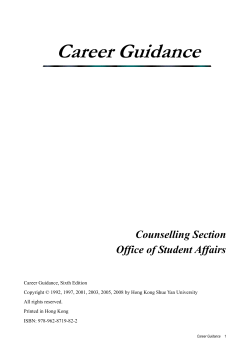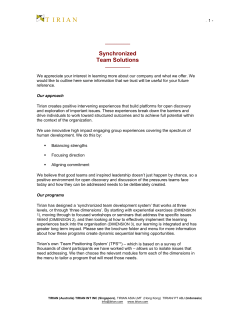
Document 58153
Tuesday 9 April 2013 Liberal Studies E06-07 Read the story online http://edu.singtao.com/eng-s Click"Liberal studies" Depending ■ Text : Nieve Wong (Source: S-file) ■ Photos : Sing Tao Daily, internet ■ Globalisation ■ Personal Development & Interpersonal Relationships ■ Energy, Technology & the Environment ■ Hong Kong Today ■ Modern China ■ Public Health This article enables students to: 1. assess qualities, phenomena, changes, trends and impacts in relation to various aspects of society and culture; 2. apply critical thinking skills and adopt multiple perspectives in making decisions and judgments regarding social issues and problems Tackling the problem on parents YOUNG people crave independence. Becoming a boomerang child is the last thing they wish for. What can they or others do to help? In a city with low birth rates and an ageing population, a growing generation of ‘boomerang children’ threatens to overburden the SAR’s fragile economic and social health ‘B Category Reasons for returning home Percentage University graduate Being too picky to get a satisfactory job 20% Unsatisfied with work Quitting the job because they feel like staying at home 20% Entrepreneur dreamer type H a v i n g s t r o n g entrepreneurial aspiration but lacking the knowledge and strategies for starting a business 20% Switching between jobs Constantly looking for new jobs while employed until they cannot find one anymore 10% Limited to taking lowskilled jobs as cheap labour, often ends up staying at home 30% Low cultural competence and skills Boomerang children are the result B of overprotective parents and a o Personal discouraging economic climate. If they Youths ought to know their obligations and responsibilities, which include sustaining their families and contributing to society. Living off parents is not the way out. Young people are advised to start life planning at an early stage, striking a balance between fulfilling dreams and needs. Never chase a dream that burdens the people around you. continue to live off their parents and contribute nothing, it will burden not only their family but also the entire society. Parental As much as the parents may desire their domesticated children in their homes, they are being burdened in many ways. Charging their boomerang children for household expenses or rent could be a good way to avoid being taken advantage of and curb overspending. After all, young adults must learn to take up responsibilities, at least for their own part. Unconditional support from parents will only get in the way of developing their independence. OOMERANG children’ refers to grown adults who return home to live with their parents and depend greatly on. Sociologists have coined this phenomenon ‘Neo-Youth Unemployment Group’ (新失業群體). Boomerang children can be categorised into the following: ‘Boomerang’ types Key ideas The rise of boomerang children is, quite simply, a vicious cycle sustained by the government who does little to help stabilise the property market. Unaffordable, skyrocketing housing prices make it unrealistic to discuss independence. Many have given up hopes of starting a family and working towards owning a home because their earnings fail to keep up with inflation. At the end of the day, the government holds the key to young people’s independent futures. Failing to address the problems of housing and high living costs will only worsen the situation. Boomerang children will eventually not only burden individual families, but also slow down the whole economy. THE term ‘boomerang children’ might be new to Hong Kong people, but their effect is not. The latest Census and Statistics Department (統計處) study revealed that in 2011, out of 860,000 youths aged between 15 and 24, 94.6 percent live with their parents – a 3.1 percent increase from ten years ago, with young adults of the 24-30 age group yet to be counted in the study. Many families have already experienced this phenomenon. This social trend is on its way to becoming a worldwide endemic with 30 percent of youths depending on financial support by their parents. In the US, the number of young adults living with parents has reached 15.8 million, an increase of 1.2 million from four years ago. Britain, Canada and Japan see similar problems. According to the 2011 Population A Census results, there are approximately C 860,000 young people aged between 15 and 24, taking up 12 percent of the entire population of Hong Kong. Figures also show that over 94 percent of them live Governmental A worldwide trend Did you know? with their parents. Those who still live with their parents after marriage rose from 14 percent to 29 percent in ten years. property market ↑+ value of academic qualification ↓+ cost of living↑ •quality of living •ageing population •youth problem What are the causes? youths getting married ↓ + number of them moving out ↓ boomerang children in Hong Kong ↑ References •goals, expectations •life planning •self-esteem www.youtube.com/watch?v-wuDjln w OksbA O 2012/aug/24/generation-boomerang- mentality: positive → negative global social phenomenon overview Social mobility decline With the globalisation of technology and a knowledge-based economy comes the problem of excessive labour, as productions have been computerised and academic qualifications reduced in value. Therefore, young adults who cannot secure a suitable job turn to family for support. There are some of them who have long been excluded from the labour market, losing the motivation for work and making them pessimistic ‘homeboys’. endemic (v) 流行病 outrageous (adj) 令人無法容忍的 causes China: approx. 30% US: approx. 50% Europe: above 40% ion pens In Hong Kong, such unhealthy dependence on family support largely attributes to outrageous property prices and difficult living conditions. The poor economic outlook across the US and Europe takes some of the blame for this ‘home-returning’ trend. picky (adj) 挑剔的 2. Who is most to blame for the adultescents High living costs amid poor economy Vocabulary problems young people are facing? www.guardian.co.uk/lifeandstyle/ BOOMERANG children are a global social issue. Causes vary from one country to another. Since the start of the ‘one-child policy’, parents in China have been spoiling their only child. They do not allow them to deal with economic problems alone. Since Asian countries strongly value family ties, most parents do not mind taking their children back into their homes. This has discouraged their children from becoming independent and pursuing their careers resulting in an increase of boomerang children. savin gs phenomenon would develop with Personal Growth and Interpersonal Relationships Traditions and cultures $100 1. How would you think this social 1 boomerang children trend? Boomerang children Hong Kong Today Critical questions US: boomerang children UK: NEET France: kangaroo generation Japan: ‘furita’ Taiwan: rice worms influence spoiled by parents→ youth autonomy↓ youth quality↓ competitiveness↓ global economy↓→ job opportunity↓ parenting style changed Globalisation •European debt crisis •economic globalisation •technology development vicious cycle (n phr) 惡性循環 Country Name Meaning China The gnawing old group (啃老族) Those who live off their old parents Young people who are out of school and unemployed France Kangaroo generation (袋鼠族) University graduates who evade work and depend on their parents because of low income Britain NEET (尼特族) Not in Education, Employment or Training The US Boomerang kids (歸巢族) Kids who return to and rely on their family for parental care and economic support Modern China Japan Furita (飛特族) Part-timers and freelancers doing low-skill jobs •family concept •parenting style Taiwan Rice worms (米蟲)/ Squat-at- Exhausting home resources without homes (家裡蹲) making family contributions youth adjusting mentality social stability↓ ‘Boomerang children’ around the world Hong Kong Non-engaged youth (雙失青年) population ageing→ productivity↓ social stability↓ life planning (n phr) 生涯規劃 improvements government providing support sustain (v) 支持 skyrocketing (adj) 飛漲 inflation (n) 通脹
© Copyright 2025





















